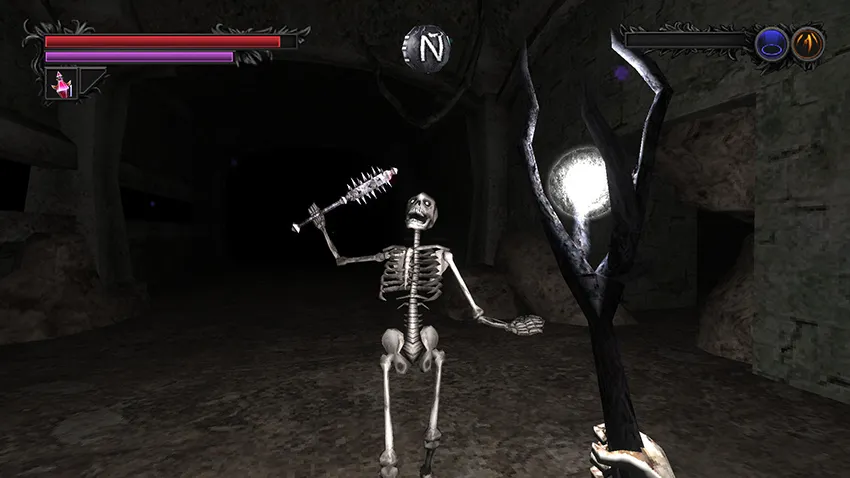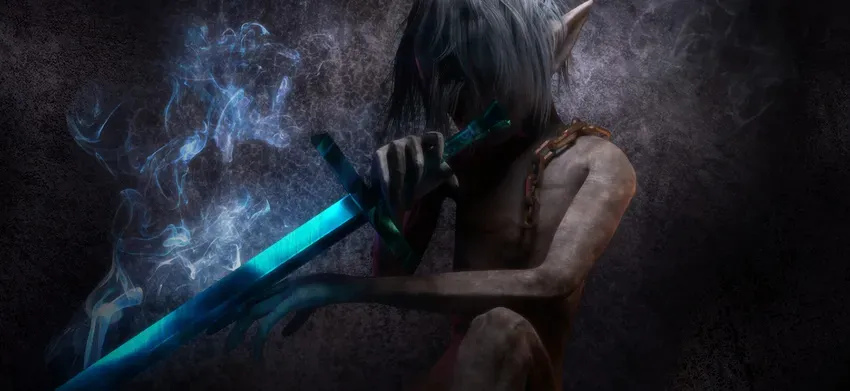Before the massive success of its "Soulsborne" games, game studio From Software released King's Field, a first-person dungeon-crawl RPG with real-time combat. A few sequels and a console generation later, Shadow Tower Abyss hit the shelves. It was a refinement of the King's Field formula, and it also broke the mold by adding modern firearms to the dungeon-crawl experience.
Lunacid doesn't go so far as to put an assault rifle next to a longsword, but it very well could have. The game is set on what seems to be a postapocalyptic Earth, centuries after an elder god's awakening cast humanity back into the Stone Age. You begin as a sorry fellow who, accused of thieving, has just been thrown into a very deep hole called the Great Well.
I've found it difficult to introduce Lunacid in a way that, to my satisfaction, summarizes my feelings about it. I haven't played any of the King's Field or Shadow Tower games, and yet, while exploring the depths of the Great Well, I often had that rare and coveted sense of inner warmth, which can only come from nostalgia being set aflame by a spark of recognition.
And a spark is all Lunacid really needs, because the game doesn't rely solely on nostalgia. If it did, it wouldn't have such a strong identity of its own. After all, nostalgia, while potent, can be a hollow desire, which when fed nothing but itself only grows deeper and more bitter. How often do we return to a game, or other figment of our past, and find that the "magic" we remember never made it to the present?
Then again, sometimes we leave things in the past, not because they're truly antiquated but because we assume that they're inferior to the new. When From Soft shifted to third-person action games with the release of Demon's Souls, it left behind a few key parts of the old formula.
Lunacid repurposes these parts to create a combat system that's delightfully simple but still varied enough for each player to develop their own approach.
To summarize, a player can equip two weapons and two spells at once. For a weapon attack to deal maximum damage, the player has to hold the attack button until a meter in the upper right is full. After that, they can release the button at any time to strike. They can also release it earlier or just spam it to swing wildly, but this will do less damage overall than a series of fully charged, well-timed attacks.
Each weapon has its own attributes, like damage, reach, charging speed, blocking efficiency, and "thrust" (how far an attack pushes the player forward or back), so a rapier and a greatsword will each handle very differently. There are also ranged weapons, like the crossbow, which have unlimited ammo but lack the ability to block.
Like weapons, spells need to be charged, but they can only be cast when charged fully. This can be done independently from charging a weapon attack, so it's possible to be bashing or shooting a foe while preparing a blast of magic to finish them off.
The King's Field and Shadow Tower games have been described as having a slow pace. Their combat is often a matter of strafing around an enemy to avoid their attacks, or moving in to strike and then backing out of range before the foe can retaliate. Lunacid's combat can play out that way, but it can also play closer to games like Quake; it all depends on how you build your character.

As in many RPGs, slaying enemies earns you experience points that are used to level up. Each level grants skill points that can be spent to better define your play style.
Unlike its predecessors, Lunacid lets you spend skill points to increase your character's mobility. Dexterity dictates your character's jump height as well as their damage with ranged weapons. Speed, as one might expect, dictates your character's running speed.
For my first run through the game, I ended up putting nearly a half of my skill points into Dexterity and Speed, just so I could explore more easily, and evade foes by either outrunning them or leaping out of their reach, all the while pelting them with arrows and magic.
One might assume that this strategy trivialized combat, but it wasn't foolproof; if I was ever cornered in a confined space, or subjected to the dreaded "slowed" status effect, my inferior Defense skill would do little to protect me against a direct, sustained assault. Not to mention that all the running and bouncing around made aiming and timing my attacks a measure more difficult.
That kind of situational advantage or disadvantage is a large part of any RPG's appeal. If I had dumped all of my skill points into Strength, Defense, and Resistance instead, and focused on using melee weapons and blocking, a confined space like a tunnel could have been a boon, as it would have forced my foes to fight me one by one.
Before you invest any skill points or collect any weapons, of course, you have to create a character. Lunacid follows its precursors in having the player enter a name and choose a starting class, which determines the character's base skills and susceptibility to different types of damage.
But here the game diverges from the norm by letting you choose your character's pronouns, which include neopronouns like fae/faer, ey/em, and the like.
For my first run, I went with he/him because I'm basic, and moved on to flipping through the default character portraits. Since you never see more than your character's hand during gameplay, a portrait is the closest you can get to customizing their appearance.
I was thrilled to find out that you can move custom portraits into the game files and use them instead. So at least superficially, your character can look however you like. And it astonished me just how much deeper that drew me into the experience; suddenly, I wasn't playing as some boring old humanoid but a samurai rabbit with mottled fur and kind eyes.
Lunacid's predecessors also have a reputation for being dark, brutally difficult, and punishing in some way, but it diverges here, too. It has its fair share of darkness, with haunted tombs and eerie temples, but it's often only as punishing as the player chooses to make it. Dying simply sends the player to their most recent save, and there's really no deterrent to saving often – other than the fact that it can only be done by touching a warp crystal in one of many set locations.
It's no wonder, then, that Demi (a small demon with a scythe) often reminds the player to "stay safe," because forgetting to save for a long stretch before dying is a bummer. On that note, all of the nonplayer characters are cute as buttons. There's even a pink slime hidden away somewhere who can become your character's girlfriend.
Kira, the developer behind this indie masterpiece, specializes somewhat in creating games with a Playstation 1- or Nintendo 64-era aesthetic. With a colorful world to explore, a soundtrack full of bangers, and enough personality to make other games in the dungeon-crawl genre blush, Lunacid is as much a love letter to the old classics as it is a classic in its own right.
To learn more, you can visit Kira's website at https://www.kira-llc.com
Lunacid is available for purchase on Steam at https://store.steampowered.com/app/1745510/Lunacid


